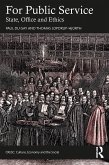In "Ethics in Service," William H. Taft delves into the intricate relationship between ethical principles and public service. This work, suffused with a clear and engaging prose style, navigates the complex moral quandaries faced by public servants and offers a comprehensive framework for ethical decision-making. Positioned within the broader context of early 20th-century American moral philosophy, Taft draws on an array of historical examples, legal precedents, and philosophical arguments to underscore the necessity of ethics as the backbone of effective governance and social responsibility. William H. Taft, the 27th President of the United States, was deeply influenced by his extensive experience in law and public office. His tenure in various governmental roles endowed him with a pragmatic understanding of the ethical challenges inherent in public service. This background not only lends credibility to his arguments but also reflects his lifelong commitment to the ideals of civic duty and integrity, which continue to resonate in conversations around governance today. "Ethics in Service" is a vital read for anyone invested in the fields of public administration, political science, and ethics. Taft's insightful examination of morals in governmental positions provides timeless relevance and guidance for contemporary leaders, aiming to cultivate a culture of responsibility and transparency in service.
Dieser Download kann aus rechtlichen Gründen nur mit Rechnungsadresse in A, B, BG, CY, CZ, D, DK, EW, E, FIN, F, GR, H, IRL, I, LT, L, LR, M, NL, PL, P, R, S, SLO, SK ausgeliefert werden.









